Related Research Articles

The Rubiaceae are a family of flowering plants, commonly known as the coffee, madder, or bedstraw family. It consists of terrestrial trees, shrubs, lianas, or herbs that are recognizable by simple, opposite leaves with interpetiolar stipules and sympetalous actinomorphic flowers. The family contains about 13,500 species in about 620 genera, which makes it the fourth-largest angiosperm family. Rubiaceae has a cosmopolitan distribution; however, the largest species diversity is concentrated in the tropics and subtropics. Economically important species include Coffea, the source of coffee, Cinchona, the source of the antimalarial alkaloid quinine, some dye plants, and ornamental cultivars.

Psychotria viridis is a perennial, shrubby flowering plant in the coffee family Rubiaceae. It is a close relative of Psychotria carthagenensis of Ecuador. In the Quechua languages it is called chacruna or chacrona. In Quechua, chaqruy is a verb meaning "to mix".

Psychotria carthagenensis, also known as amyruca, is a South American rainforest understory shrub from the coffee family, Rubiaceae. It grows from the tropics of South America to Mexico.
Heliconia rostrata is a herbaceous perennial native to Peru, Bolivia, Colombia, Venezuela, Costa Rica, and Ecuador, and naturalized in Puerto Rico. Other Heliconias grow in the upright position, their cup-shaped flower bracts storing water for birds and insects. This plant, however, has downward-facing flowers, the flowers thus providing a source of nectar to birds.

Psychotria is a genus of flowering plants in the family Rubiaceae. It contains 1,582 species and is therefore one of the largest genera of flowering plants. The genus has a pantropical distribution and members of the genus are small understorey trees in tropical forests. Some species are endangered or facing extinction due to deforestation, especially species of central Africa and the Pacific.
Helicia rostrata is a species of plant in the family Proteaceae. It is endemic to Papua New Guinea.

Palicourea is a plant genus in the family Rubiaceae. It contains about 200 species, which range from shrubs to small trees, and is distributed throughout the New World tropics.

Carex rostrata, the bottle sedge or beaked sedge, is a perennial species of sedge in the family Cyperaceae.
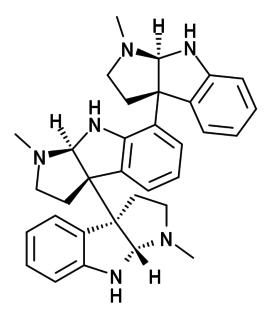
Hodgkinsine is an alkaloid found in plants of the genus Psychotria, particularly Psychotria colorata, although it is also found in Psychotria lyciiflora and probably other species in this family,

Rostratus (masculine), rostrata (feminine) or rostratum (neuter) is a Latin adjective meaning "beaked, curved, hooked, with a crooked point, or with a curved front".
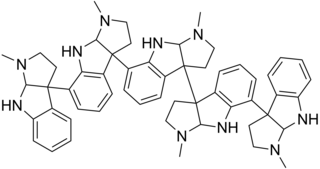
Psychotridine is an alkaloid found in some species of the genus Psychotria, namely Psychotria colorata, but also Psychotria forsteriana, Psychotria lyciiflora, Psychotria oleoides, and Psychotria beccarioides. Psychotridine has analgesic effects and dose-dependently inhibits dizocilpine binding to cortical membranes in vitro, suggesting that it acts as a non-competitive NMDA receptor antagonist.

Psychotria nervosa, also known as Seminole balsamo or wild coffee, is a shade tolerant medium-sized shrub native to Florida as well as the West Indies and Central and South America. It produces a "small, red, ellipsoid fruit" that resembles "the true coffee bean" in shape and attract birds. Its maximum height ranges from approximately 4–10 feet.
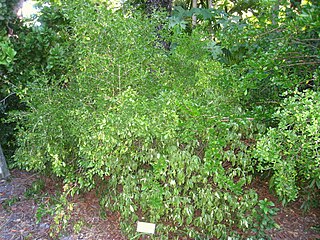
Psychotria ligustrifolia, the Bahama wild coffee, is a species of plant in the family Rubiaceae. It is endemic to Florida, Puerto Rico, and the Bahamas.
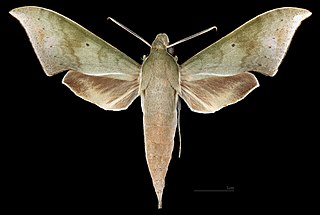
Xylophanes hannemanni is a moth of the family Sphingidae. It is known from Mexico, Guatemala, Nicaragua, Costa Rica and Panama and further south through Ecuador to Peru and Bolivia.

Macropodia rostrata, common names, the common spider crab, long-legged spider crab, long-legged crab, is a species of marine crab in the family Inachidae. The Macropodia Rostrata visually mimics many other types of small crabs with the exception of its long legs. By attaching algae to their thin legs, they can be confused with the stem of seaweed. This is both a defense mechanism and a predatory advantage, as unsuspecting fish will hide in seaweed beds from nearby predators. This behavior can be absent among larger crabs, and those that live at great depths like giant Japanese spider crabs.

Psychotrieae is a tribe of flowering plants in the family Rubiaceae and contains about 2114 species in 17 genera. Its representatives are found in the tropics and subtropics.
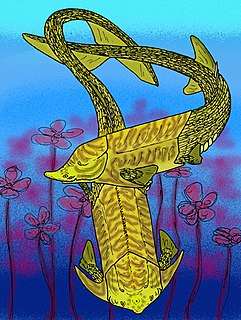
Qilinyu rostrata is a "maxillate" placoderm from the late Ludlow epoch of Qujing, Yunnan, 419 million years ago.

Hakea rostrata, common name beaked hakea, is a flowering plant in the family Proteaceae, native to South Australia and Victoria.
References
- ↑ "Psychotria rostrata (No common name)". zipcodezoo.com. Archived from the original on February 29, 2012. Retrieved 2008-04-24.